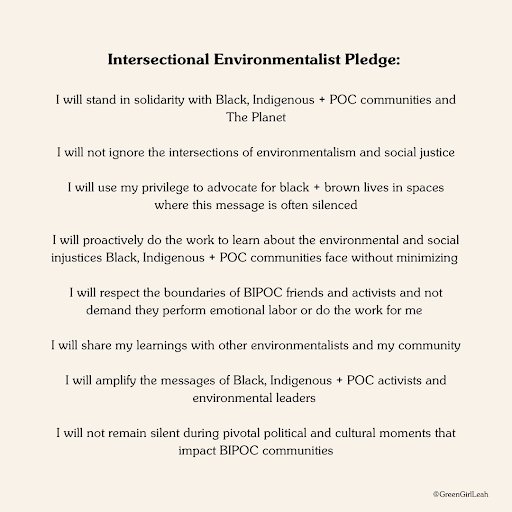Holding Environmentalism Accountable: An Intro to Intersectional Environmentalism
Our recent blogs have mentioned a bit about Environmental Justice, the movement in response to the fact that environmental issues and climate change disproportionately impact low-income and BIPOC communities. This begs the question - is all environmentalism inherently just? It should be, but it is not. Though well-meaning in their ultimate goal, environmental and earth sciences (and STEM fields in general) are highly lacking in diversity.
This rings especially true in the energy industry. Take a moment and think about the last time you were at an energy conference or meeting. Put the COVID-ignited nostalgia aside, and recall who else was in the room. Let me guess, a bunch of white guys. Why do we think that is? It is not because BIPOCs care less about the impending doom of climate change. In fact, research has found that “in many cases, minorities are equally as supportive, and often more supportive of national climate and energy policies, than white Americans.” So why are their voices largely missing?
Recent events, and the resurgence of the Black Lives Matter movement in white spheres, have reminded us that our white privilege is what allows us to even have the capacity to focus on environmental issues. Marine biologist and policy advisor Ayana Elizabeth Johnson shares her perspective and experience as a Black climate expert in this piece in the Washington Post. She says, “How can we expect black Americans to focus on climate when we are so at risk on our streets, in our communities, and even within our own homes? How can people of color effectively lead their communities on climate solutions when faced with pervasive and life-shortening racism?”
Answer: We can’t. They can’t. And this is why we need Intersectional Environmentalism. Intersectionality is the belief that oppressions are interlinked and cannot be solved alone.
Intersectional environmentalism, is then the inclusive form of environmentalism that advocates for the protection of both people and the planet. We cannot solve environmental issues without also addressing other forms of oppression. If you seek to attack one power structure but do so by treading on other oppressed groups, then you are still perpetuating oppression. The fight against climate change must exist alongside the fight against white supremacy, racism, and colonialism - all the power structures driving inequality.
Studies have found that in high-income countries with high income-inequality (such as our own), investing in poor communities and closing that gap corresponded with a reduction in carbon emissions. “In more unequal societies, those who benefit from pollution are more powerful than those who bear the cost. Therefore, the cost-benefit predicts an inefficiently high level of pollution. This implies a positive correlation between income inequality and pollution”. A local example of this is the fact that two percent of buildings produce nearly 50 percent of New York City’s carbon emissions.
Advocating for energy efficient buildings and renewable energy is a good and worthwhile effort that we can and should continue, however, we cannot let these aspects of our work give us the moral high ground that we feel excuses us from taking action elsewhere. We must continue to advocate for legislation like Local Law 97 that are more closely in line with Intersectional Environmentalist and Environmental Justice principles. We can’t just jump on the Black Lives Matter bandwagon this week because it’s trending and hop off the next - we must be in it for the long haul. Will you join us in joining the alliance and taking the Intersectional Environmentalism Pledge?

(Image and Pledge courtesy of @GreenGirlLeah)